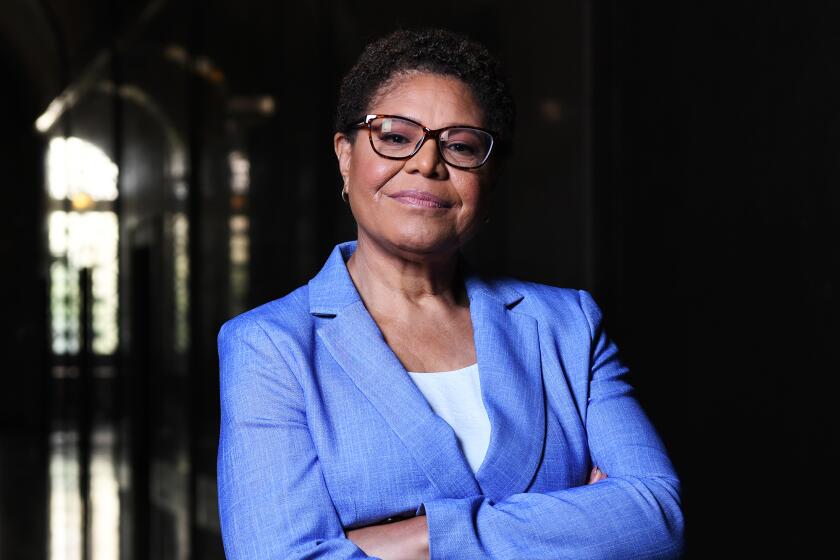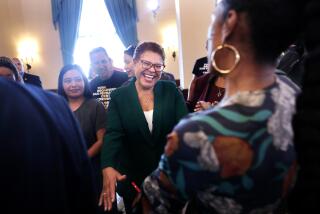USC scandals assume starring role in L.A. mayor’s race, with Bass, Caruso pointing fingers
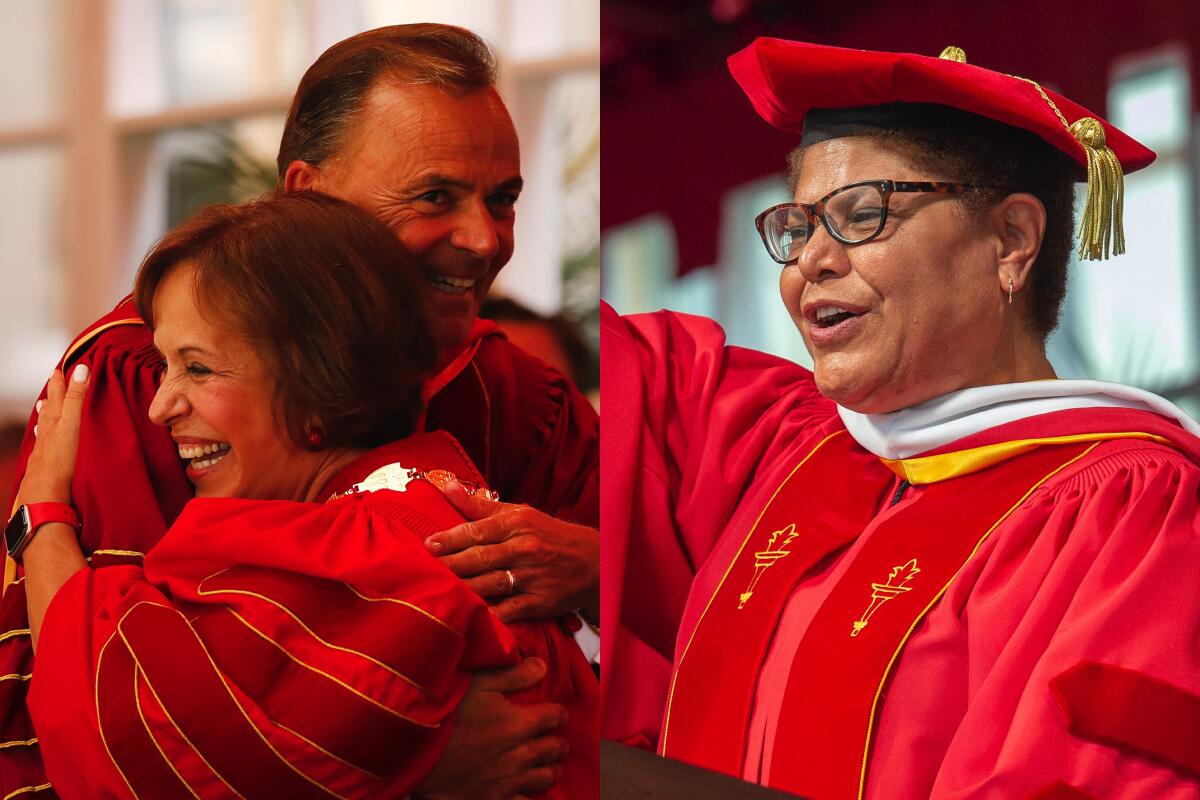
- Share via
At USC’s commencement ceremony in 2019, Rep. Karen Bass and Rick Caruso marched across campus in crimson gowns, beaming at the thousands of soon-to-be graduates and their families.
Both alums of the private university, the congresswoman and the developer sat side by side onstage, laughing and flashing the two-finger salute known to USC’s legion of proud fans.
“We raise our two fingers whenever and wherever we see another Trojan,” Bass told the audience after receiving an honorary degree while Caruso, chair of the university’s board of trustees, looked on. “USC Trojans fight on until we change the world.”
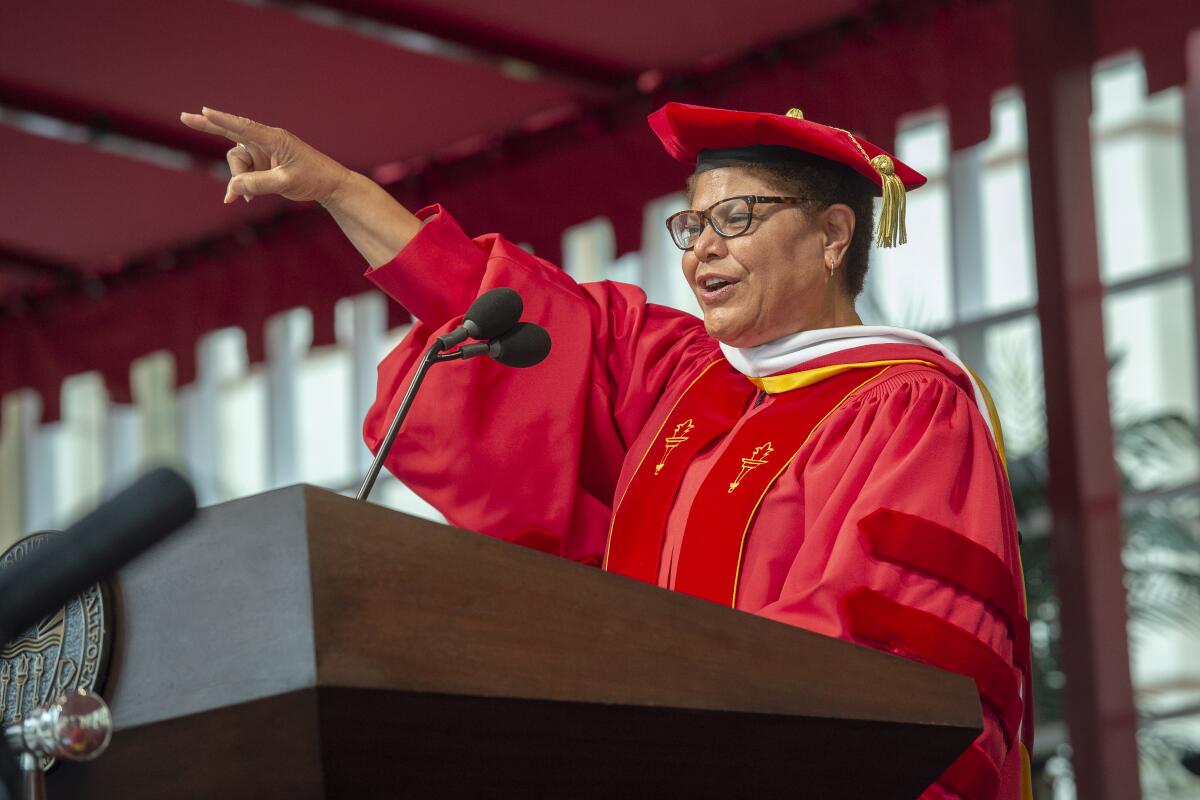
Now, less than two months until election day, Bass and Caruso are waging a bitter and personal fight to become L.A.’s next mayor, attacking each other’s character and ethics, particularly when it comes to their alma mater.
Caruso has labeled his opponent “corrupt” for accepting a $95,000 scholarship from USC before pushing favorable legislation for the university. Bass has countered by tarring the businessman, a longtime trustee, for not being transparent about the findings of an internal investigation into a gynecologist charged with sexually abusing female students.
In the process, USC has become a punching bag, a bludgeon and a running thread in an increasingly acrimonious mayoral race.
The university’s central role in the campaign season is a testament to the scale of its influence on civic life and how deeply embedded it is in Southern California’s power structure.
“We’ve had mayoral candidates and we’ve had mayors who have had close ties to USC before,” said Ange-Marie Hancock Alfaro, chair of USC’s political science and international relations department.
But, she continued, the fact that “both campaigns are trying to kind of ding the other by touting their close relationships with USC as an association with scandals” is one of the more surprising aspects of the race.
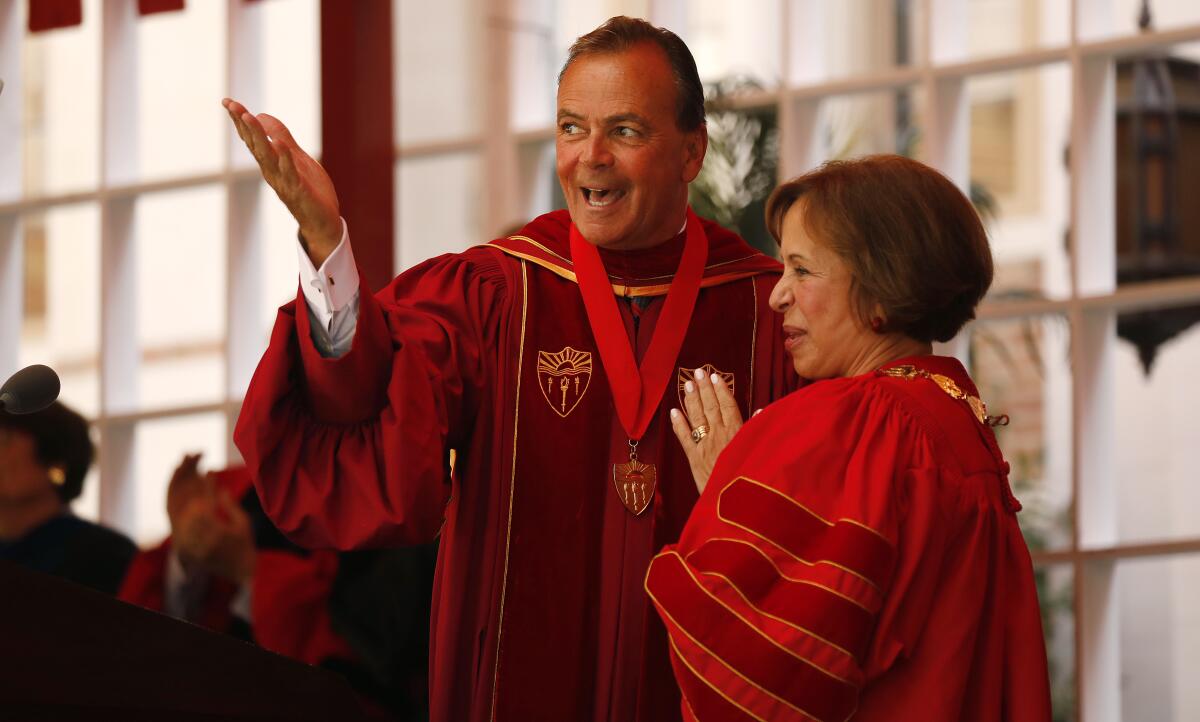
“It’s regrettable that this is the backdrop for this political back-and-forth,” said Gloria Molina, who served on L.A. County’s Board of Supervisors. “But in the deepest issues of political corruption, they’ve been in the thick of it,” she said of USC.
For decades, Molina represented the district that includes USC’s health sciences campus and hospitals in Boyle Heights. She recalled how USC’s late president, Steven Sample, and his staff would lobby her office for control over L.A. County’s hospital and other land-use issues in her district.
“They have a political arm that’s very effective. They want to control the land around their facilities,” she said. “When they are dangling these favors on elected officials, it’s no different than developers providing funds.”
Molina pointed to her former colleague on the Board of Supervisors, Mark Ridley-Thomas, who is facing trial this fall for what federal prosecutors allege was a quid pro quo with a former dean of USC’s social work program, Marilyn Flynn.
Flynn is also facing bribery and fraud charges related to the alleged deal.
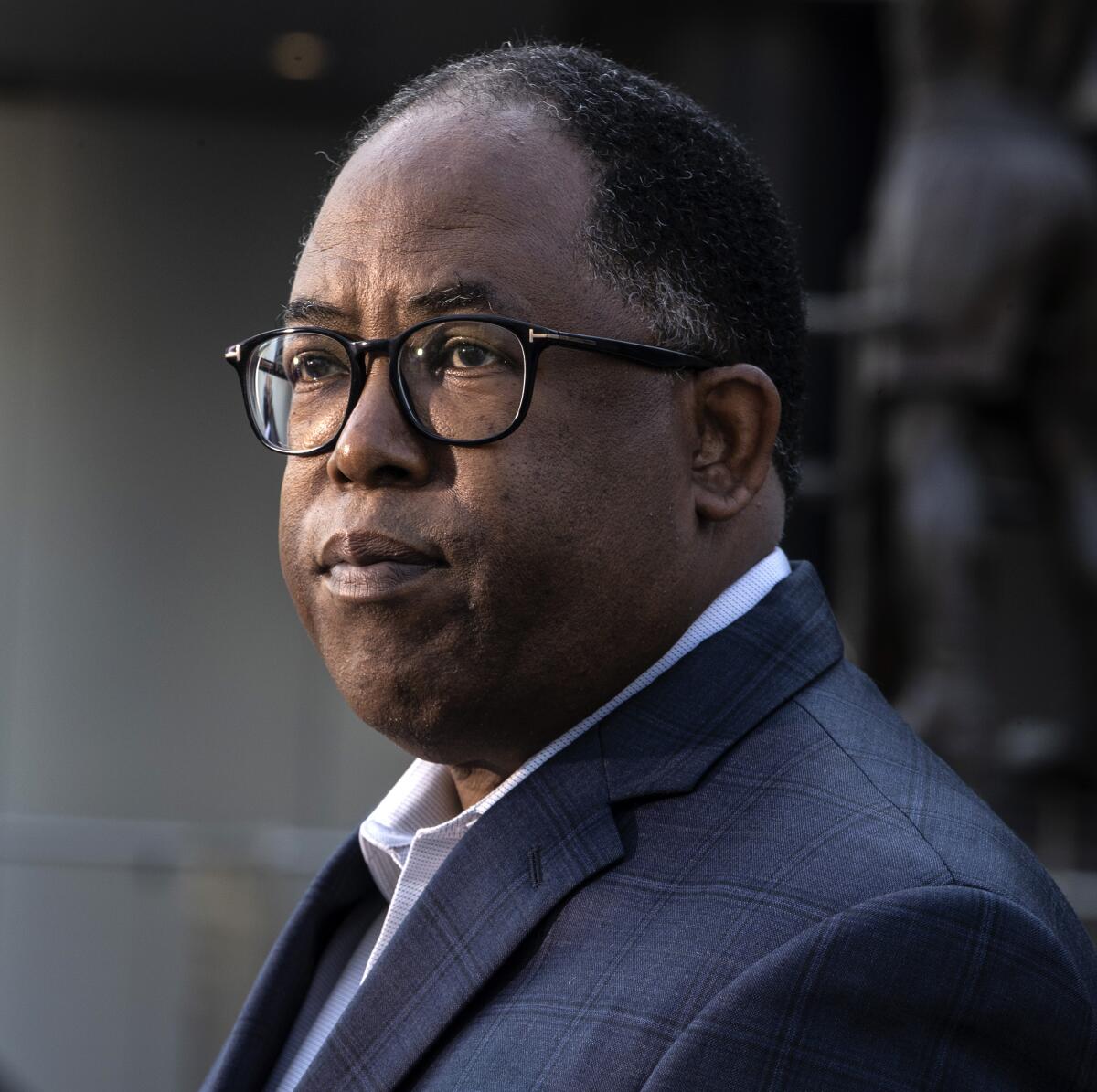
Prosecutors contend that Flynn helped provide a scholarship and employment at USC for Ridley-Thomas’ son in exchange for his father securing county contracts for the university.
Bass’ scholarship to get a master’s degree in social work while a member of Congress also came courtesy of Flynn.
The Times reported this week that federal prosecutors consider the circumstances of Bass’ scholarship “critical” to the Ridley-Thomas case — particularly an email from Flynn describing “the same” sort of scholarship-in-exchange-for-funding with Bass.
After beginning her tuition-free studies in 2012, Bass advanced legislation that would have resulted in USC and other private universities getting more federal funding.
Federal prosecutors have made no indication that Bass is under criminal investigation.
Prosecutors say L.A. mayoral candidate Karen Bass’ scholarship and her dealings with USC are ‘critical’ to a case about corruption at the university.
“She received a free scholarship simply because she was a powerful member of Congress,” Caruso said at a press conference Thursday. “This is corruption. This is dishonest, plain and simple.”
Caruso linked the scholarship to systemic graft plaguing City Hall and pushed for his opponent to release her communications with Flynn.
Meanwhile, Bass and her allies have sought to center the mall developer’s role as chair of USC’s board of trustees.
Caruso, who has repeatedly trumpeted his ties to USC as a positive on the campaign trail, took over as chair of the board after revelations of misconduct by gynecologist George Tyndall.
Caruso helped USC reach $1.1 billion in legal settlements with Tyndall’s alleged victims and overhauled the university’s leadership and governing structure. But in recent years, he backtracked on the release of an internal report on Tyndall, saying USC’s lawyers only gave oral briefings to trustees.
Minutes after The Times published its report on Bass last Wednesday, her campaign pushed out a 30-second ad slamming Caruso for “covering up” misconduct and depriving Tyndall’s victims of transparency.
“The real USC scandal we need to talk about is how he failed to protect these young women,” Bass said in a Thursday press conference.
Bass has remained quiet on USC’s many scandals for years, accepting her honorary degree from the university in the wake of the revelations about Tyndall.
The Times asked her campaign if she had previously spoken out about sexual misconduct at USC or taken actions on the subject. Her spokesperson did not address the questions.
Caruso called the ad “a desperate and dishonest attempt to distract” from her involvement in the federal corruption case.
It was a strikingly caustic tone from both candidates after a primary season where they largely avoided outright attacks on each other. Since Bass beat Caruso in the June primary by 7 percentage points, she has widened her advantage to 43%-31%, according to polls this summer.
But nearly a quarter of registered voters remain undecided — a pool that could shift the race in its final weeks.
Mayor Eric Garcetti taught at USC long before he moved into Getty House, and Antonio Villaraigosa worked at the university after his time as mayor.
But this year’s candidates have ties to USC that are more varied and deep than for others in the recent past.
Caruso was the first in his family to earn a college degree when he graduated from USC, and his children attended as well. He has donated millions of dollars to the school, where the Catholic Center and the otolaryngology department bear his family’s name.
Bass graduated from USC’s physician’s assistant program and later worked for the university. USC helped incubate the nonprofit she founded, Community Coalition, and she has maintained close ties with professors at USC, particularly in the social work program.
Get the lowdown on L.A. politics
Sign up for our L.A. City Hall newsletter to get weekly insights, scoops and analysis.
You may occasionally receive promotional content from the Los Angeles Times.
Through Bass’ time in Congress, USC leaders have annually visited her on lobbying trips, and she has often lectured on campus.
“Elected officials have to pay attention to USC. You can’t ignore it. You can’t operate around it, even if it’s not in your district,” said Hancock Alfaro, the USC political science and international relations professor.
It is one of the largest private employers in the region, and its far-reaching tentacles, compounded by its vast and loyal alumni network, extend into sports, entertainment, tourism, hospitality and business.
The school has long held influence but has actively sought out a more prominent role in the city over the last 15 to 20 years, Hancock Alfaro said.
Darry Sragow, a longtime political strategist, attorney and USC adjunct professor, recalled a guest lecturing gig at the university alongside a former state senator who works at a USC think tank.
They met at an institute named after former Gov. Arnold Schwarzenegger and stood outside the old office of former State Sen. Pro Tem and current City Councilman Kevin de León, a former fellow at the center — a mark of USC’s efforts to cultivate ties with political leaders.
“The fact that the school is drawn into a mayoral race between two finalists, both of whom have very significant relationships to the school, is just an inevitable result of all these factors that have come into play,” Sragow said.
The rise of USC and other universities in civic life has coincided with their push for global prestige while major corporations decamp L.A. or merge into conglomerates based elsewhere.
Raphael Sonenshein, executive director of the Cal State L.A. Pat Brown Institute for Public Affairs, noted “the decline of the kind of dominant downtown business sector as sort of setting a tone for the city.”
Among universities, UCLA and USC both occupy huge spaces in civic life, but USC’s is greater, he said, because of its growing physical footprint and its healthcare enterprise that stretches from Bakersfield to Newport Beach.
Last year during the decennial redistricting process, two L.A. City Council members dueled over who would represent USC’s main campus.
At the time, USC officials did not say whose district they preferred — only that the campus should not be divided.
That clash over redistricting, as well as the campaign barbs, have put USC in the awkward position of being talked about but largely unable to respond.
As a nonprofit, the university is legally barred from endorsing, supporting or opposing candidates for political office. But it is undeniably a political actor, current and former elected officials say.
The school has also long been a venue for political debates between local and statewide candidates and even hosted a mayoral primary debate this year. But it receded further from the race when senior administrators withdrew last month from hosting another debate between Caruso and Bass, citing security concerns, among other reasons
Caruso played a pivotal role in hiring USC’s president, Carol Folt, who has made decidedly neutral statements about the mayoral race.
Earlier this year, Folt struck an enthusiastic but circumspect tone. “We look forward to working with our next mayor and all our elected officials in the region,” she said.
More to Read
Sign up for Essential California
The most important California stories and recommendations in your inbox every morning.
You may occasionally receive promotional content from the Los Angeles Times.
